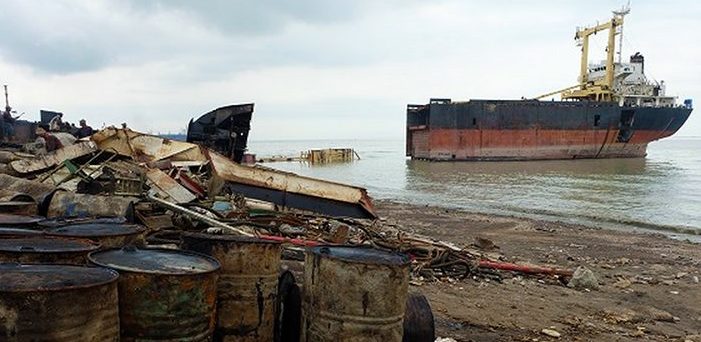Small Fleet Owners Face Critical Awareness Gap as Hong Kong Convention Deadline Nears
Dubai | As the global maritime industry races toward the implementation of the Hong Kong International Convention for the Safe and Environmentally Sound Recycling of Ships (HKC) on 25 June 2025, a key segment of shipowners—small fleet operators—remain dangerously behind on compliance readiness. This stark warning emerged from discussions at Riviera Maritime Media’s Responsible Ship Recycling Forum, where stakeholders from across the industry gathered to address one of shipping’s most pressing regulatory transitions.
Yiannis Kourkoulis, vice president of sales and purchase at Best Oasis Ltd, sounded the alarm in his keynote address. He underscored the profound awareness and preparedness gap among small fleet owners operating between five and ten vessels—a group that accounts for roughly one-third of all potential ship recycling candidates globally.

“The clock is ticking,” Kourkoulis told delegates. “We expect the enforcement of the Hong Kong Convention to make vessel recycling much safer and greener. But what have most people done to prepare? Very little, especially among small owners.”
These owners, he explained, often operate in the Handymax and supramax dry bulk segments, where vessel lifespans are frequently extended well beyond the conventional scrapping age. This makes their fleets prime candidates for recycling, yet paradoxically among the least prepared.
“According to our calculations, about one-third of the fleet of potential candidates belongs to these people, to small fleet owners,” Kourkoulis stated.
Delving into the reasons behind small fleet owners’ reluctance or inability to prepare, Kourkoulis painted a portrait of tight-knit, often family-run operations bound by more than just spreadsheets. “They like older trading vessels. They know the technicalities. It’s like a hobby for them,” he said. Many ships carry family names, further entrenching emotional attachments and delaying decisions to retire aging tonnage.
But the issue is not merely sentimental. Financial constraints and administrative limitations compound the problem. Unlike larger shipowning corporations that maintain dedicated legal, regulatory, and environmental compliance departments, small fleet owners tend to operate lean businesses. Kourkoulis cited a recent interaction with a shipowner running three vessels: “He told me, ‘It’s me, my sister, my sister’s husband, and four employees.’ His compliance department is his operations department. All the departments are the same.”
Such a structure, while agile in daily operations, struggles under the weight of regulatory complexities.
Navigating the maze of maritime environmental regulations can be daunting even for seasoned professionals. For small fleet operators with limited exposure to international policymaking, understanding the distinctions between the HKC, the European Union Ship Recycling Regulation (EU SRR), and other overlapping frameworks is a major challenge.
“It’s not easy for them. It’s quite complicated actually,” Kourkoulis said. “They do not really understand the difference between Hong Kong Convention, the EU SRR, all of these things that we analyse in this conference.”
He recounted a recent conversation with a shipowner who assumed the EU SRR would become obsolete once the HKC comes into force—a dangerous misconception. “I told him, ‘No, that’s not the case. The EU SRR remains in effect for EU-flagged vessels or those calling at EU ports.’
Language barriers further exacerbate the situation. Many small owners, particularly those based in Greece, Italy, and parts of Asia, are non-native English speakers. “Imagine having a Greek or Italian shipowner who is 75-80 years old studying a technical document in English. It’s not the easiest thing for them,” Kourkoulis said.
The Inventory of Hazardous Materials (IHM) represents another critical stumbling block. While most small fleet owners have complied with Part I of the IHM—required for ships in operation—the transition to IHM Parts II and III, essential before a vessel can be recycled under HKC rules, is largely overlooked.
“They just believe someone else is going to undertake it for them,” Kourkoulis explained. “This is not true, and it creates a serious bottleneck when the time comes to recycle.”
Failure to produce a complete IHM could mean costly delays. “If you’re about to sell your vessel for recycling and realise you don’t have IHM Part 2 and 3, you’ll need to stop the vessel,” he warned. “You’ll have to cover operating expenses, pay the crew, service your debt—everything—while waiting for lab results or inspections to be completed.”
Perhaps the most critical oversight among small fleet owners is the shift in liability that the HKC brings. In the past, owners could pass a ship to cash buyers for demolition, sign off on the protocol delivery, and wash their hands of the environmental impact. That model is obsolete under the new convention.
“Liability now follows the owner and the manager of the vessel until the successful completion of the recycling process,” Kourkoulis emphasized. “That’s a paradigm shift. And many are completely unaware.”
This extension of legal responsibility carries significant implications. In the event of environmental contamination or workplace accidents at the recycling yard, owners may find themselves subject to investigations and legal proceedings, even years after the vessel changes hands.
Despite the creation of industry tools—ranging from checklists and guides to webinars and compliance templates—engagement among small owners remains tepid. Kourkoulis argued that the communication strategies employed thus far are ill-suited for their target audience.
“We need to speak their language. We need to give them simple examples,” he advised. “Case studies work much better than legal documents.” While organisations like classification societies and ship recycling facilities have ramped up efforts to offer technical support, their capacity will likely be stretched thin once the Convention enters into force. “If everyone waits until the last minute, there simply won’t be enough resources to help them all simultaneously,” he warned.
The solution, according to Kourkoulis, lies in industrywide engagement. Stakeholders must collaborate to bridge the knowledge gap—not only for compliance’s sake but for the credibility and sustainability of the industry as a whole.
“If we make them understand, one-third of the candidates for recycling will do it properly,” he concluded. “That’s a major impact. We all need to try and push toward this direction.”
Author: shipping inbox
shipping and maritime related web portal








